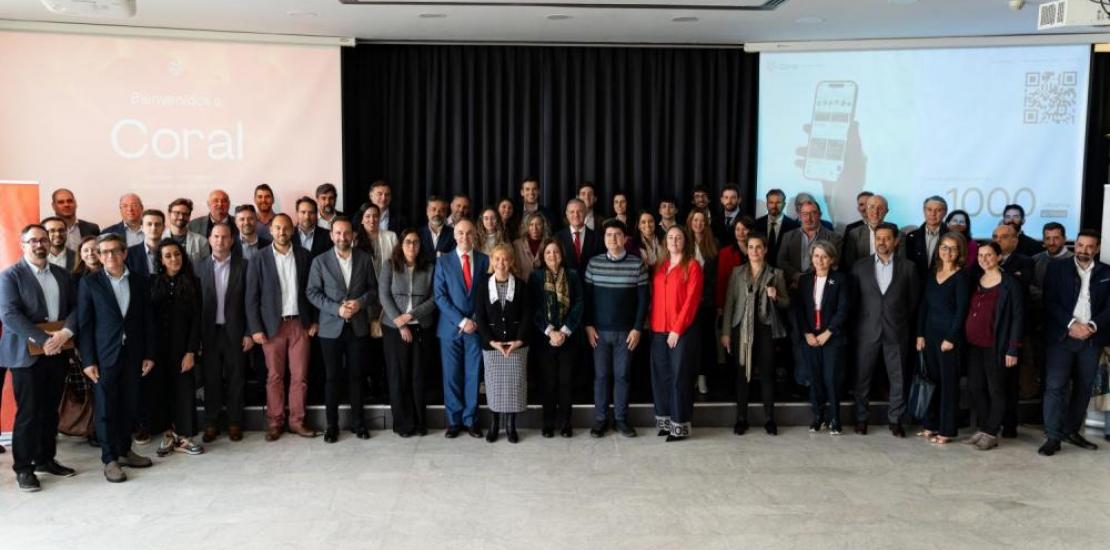Coral, the largest ecosystem to promote scientific entrepreneurship in Spanish, is launched
This initiative, promoted by UCAM HiTech and Celera, already has the support of numerous prestigious institutions and more than 1,000 registered members.
Spain takes a firm step towards strengthening its innovation ecosystem with the launch of Coral, the largest community dedicated to scientific entrepreneurship in Spanish. Driven by UCAM HiTech, the innovation hub of the Universidad Católica de Murcia (UCAM), and Celera, an association founded to identify and promote young talent in Spain, Coral was created with the mission of connecting researchers and scientists, entrepreneurs, universities, companies and investors, fostering the creation and growth of science-based startups with global potential.
Coral, which is co-financed by the European Social Fund Plus through the Employment, Education, Training and Social Economy 2021-2027 programme and with the collaboration of the INCYDE Foundation, is inspired by the collaborative dynamics and transformative impact of coral reefs. This community, which is mainly driven through a completely free and open-access digital platform, aims to become the essential catalyst for scientific entrepreneurship in the Spanish-speaking world. In the future, the community will also be articulated through face-to-face networking events, further strengthening the connections between its members.
Coral was born with a horizontal and collaborative vision between institutions, and already has a solid network of more than 30 partners. This network covers a broad spectrum of key entities in the scientific entrepreneurship ecosystem, including public and private universities from a large part of Spain, such as the University of Valencia (ICMOL), the University of Las Palmas de Gran Canaria, the University of Navarra, the CEU San Pablo University in Madrid and UCAM, prestigious institutions such as the Madri+d Foundation, Madrid City Council, the Andalusian Ministry of Health through the Health and Progress Foundation, the Catalan Institute of Nanoscience and Nanotechnology and the Madrid Science Park Foundation; leading entities of unique value for the sector such as Deeplabs, financial entities such as Caixabank DayOne and Cajamar, specialised hubs and accelerators such as Biohub and Bioval in Valencia, Bioga in Galicia and Abiomur in the Region of Murcia, and investment funds focused on technology transfer such as Clave Capital. In addition to this powerful network of collaborators, Coral already has an active community of over 1,000 registered members, which underlines the great interest and need for such an initiative in Spain.
Coral responds to a critical need in the Spanish landscape: the effective conversion of the country's solid scientific research into high-impact ventures. Despite Spain's outstanding position in scientific production worldwide, there is a significant gap in its capacity to convert this knowledge into innovative enterprises. Coral presents itself as the bridge that links science and the market, providing the necessary infrastructure and support so that Spanish scientific talent can develop its entrepreneurial potential.
Coral's community, delivered through a comprehensive digital platform focused on scientific entrepreneurship, offers a full range of resources for its members. This includes specialised content such as resources, practical guides, case studies and webinars with experts in science and technology commercialisation. It also provides a digital space for strategic networking, facilitating connection and collaboration between researchers, entrepreneurs, investors and companies interested in scientific innovation, with the plan to complement this online interaction with future face-to-face events. Finally, Coral offers visibility for scientific projects, acting as a platform for researchers and entrepreneurs to make their initiatives, technologies and collaboration or funding needs known.
Today, 2 April, the official launch of Coral took place at an event at the Círculo de Bellas Artes in Madrid, marking a crucial milestone for the Spanish scientific entrepreneurship ecosystem. This event has served as an initial meeting point for community members and other key stakeholders interested in driving the next wave of scientific innovation in the country.
‘From the onset, we have believed in the need to commit ourselves to a national model with international projection. With initiatives like Coral, we seek to provide researchers and entrepreneurs with a space where they can train, share knowledge and find support to bring their projects to market,’ stated María Dolores García Mascarell, UCAM President.
For his part, Javier García, president of Celera, highlighted that ‘at Celera, we have been identifying and promoting young talent in Spain for a decade. Coral is a natural extension of our commitment, providing a community that facilitates access to key resources and connections to transform innovative ideas into business realities.’
According to Andrea Martos, director of Coral, it ‘was created to unlock the enormous scientific potential of our country. Coral is much more than a platform; it is a living ecosystem where science and entrepreneurship meet to tackle tomorrow's problems today. Our vision is clear: to give wings to Spanish researchers and scientists so that they can turn their discoveries into successful companies, thus generating a positive impact on society and the economy.’
The event was also attended by authorities from the Community of Madrid, such as the Regional Deputy Minister of Economy and Employment, Daniel Rodríguez, and the Regional Director General of Entrepreneurship, Irene Correas.
With the launch of Coral, the Spanish scientific entrepreneurship ecosystem is entering a new era of collaboration and growth, driving innovation from science to society.




